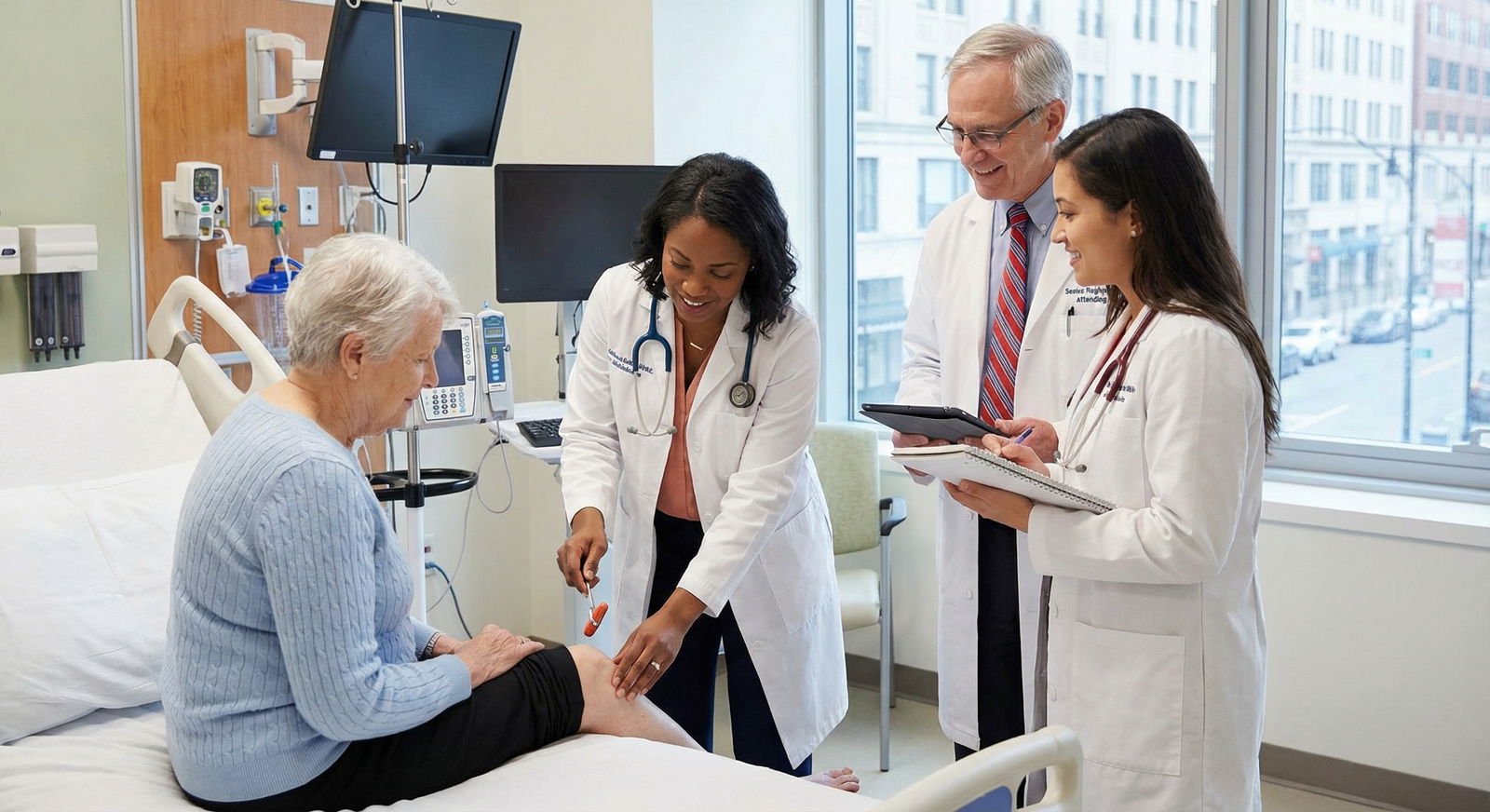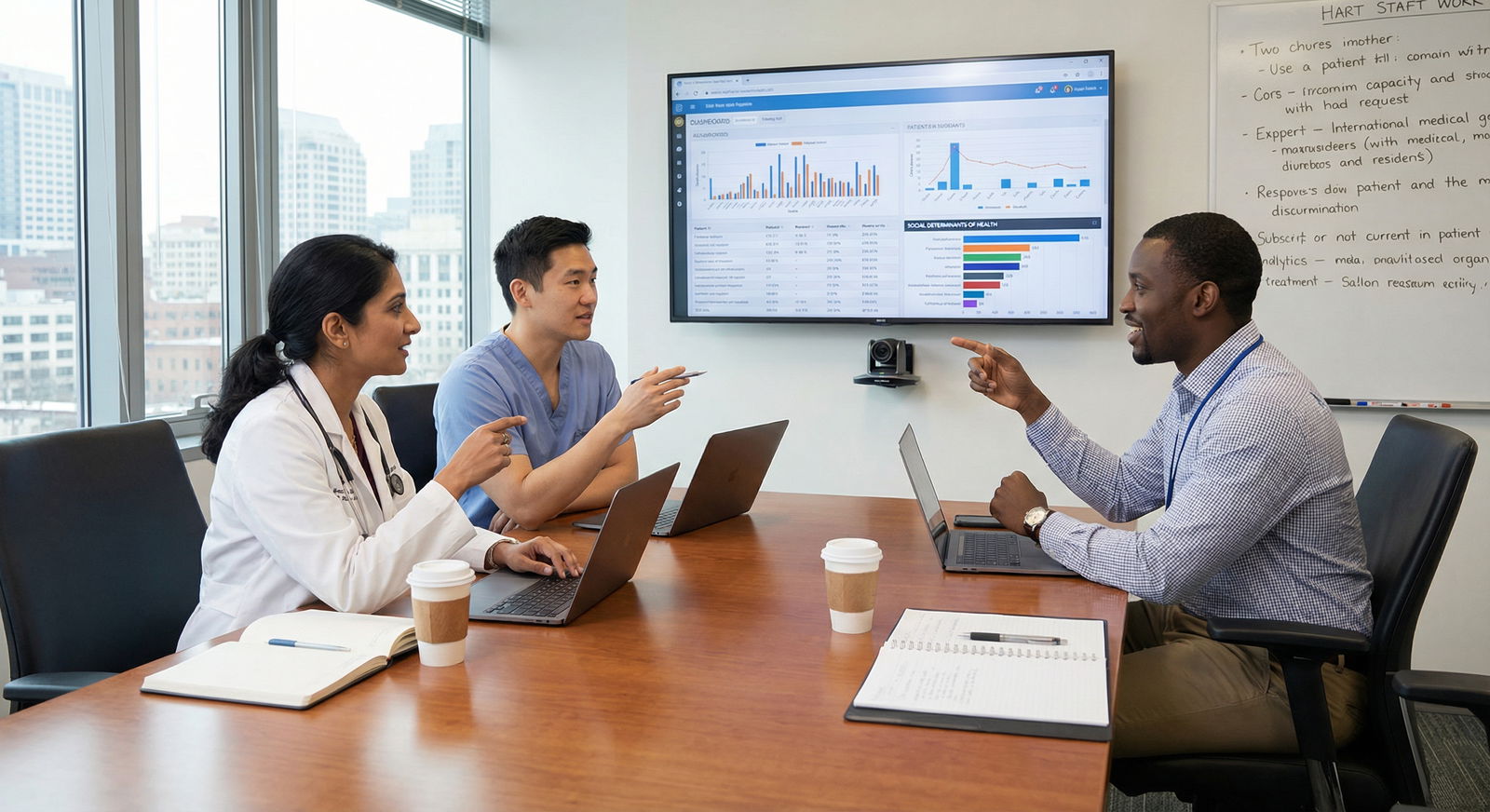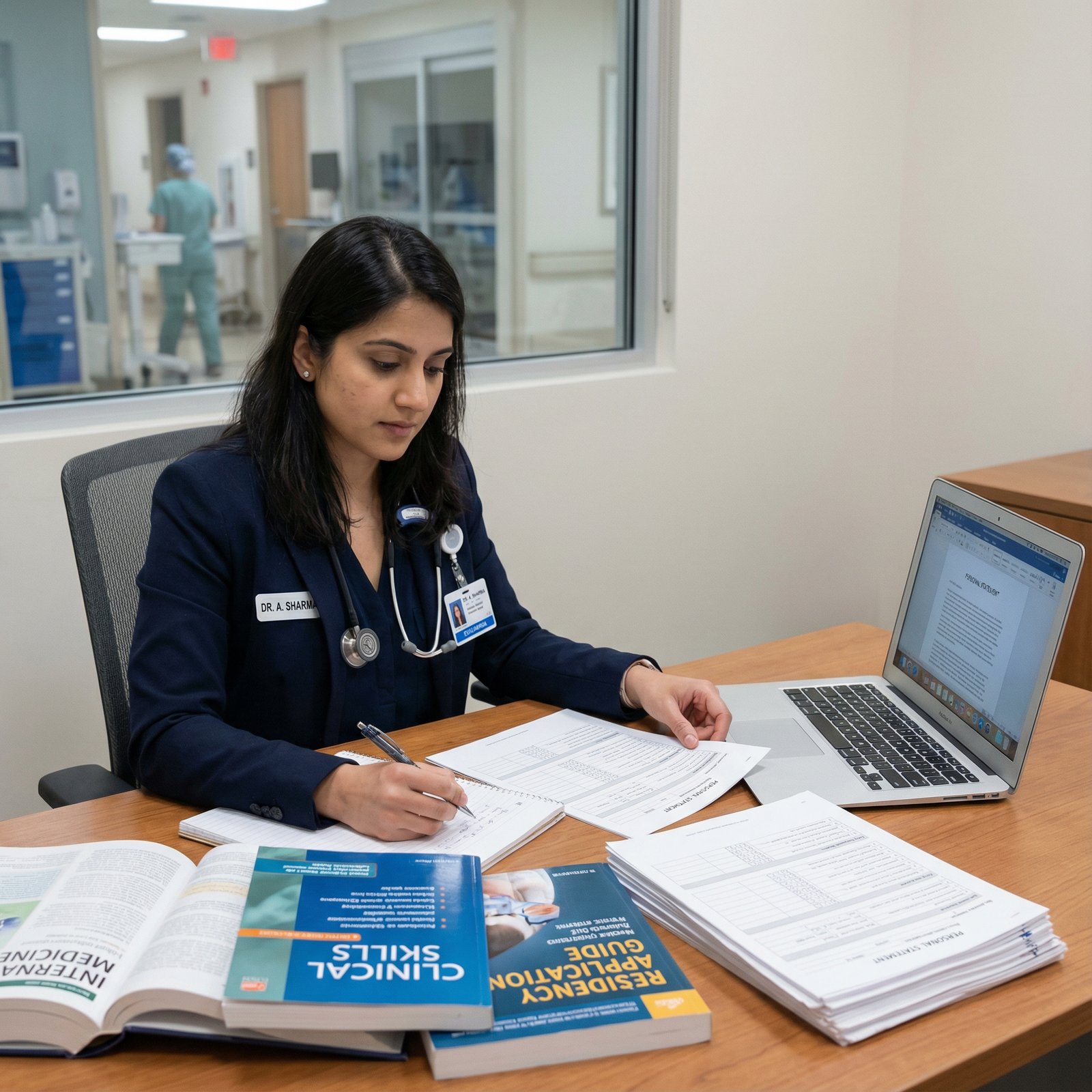
Why Hands-On Clinical Experience Is a Game Changer for IMGs in the U.S.
International Medical Graduates (IMGs) bring rich training, diverse perspectives, and a deep commitment to patient care. Yet when they transition into the U.S. healthcare system, they face a distinct set of challenges: unfamiliar clinical workflows, differences in documentation and communication, and a highly competitive residency match process.
Among all the variables that impact success, one factor consistently stands out as transformative for IMGs: meaningful, hands-on clinical experience in the U.S.
This type of experience does far more than fill a line on a CV. It helps IMGs:
- Adapt to the expectations of U.S. residency programs
- Translate prior training into the U.S. context
- Demonstrate readiness for independent patient care
- Build a professional network that directly supports residency applications
This article explores why hands-on clinical experience is so critical for IMGs, how it shapes residency applications and long-term healthcare careers, and what practical steps you can take to secure and maximize these opportunities.
The Unique Landscape for International Medical Graduates
Before examining why clinical experience is so powerful, it’s important to understand the environment IMGs are stepping into.
Core Challenges IMGs Face in the U.S. System
Adapting to the U.S. Healthcare System
The U.S. system has its own:
- Documentation standards (e.g., detailed problem-based notes, billing-linked documentation)
- Technology (EHRs, order entry, decision support tools)
- Regulations (HIPAA, EMTALA, institutional policies)
- Care models (hospitalist systems, multidisciplinary teams, outpatient/inpatient integration)
Even highly skilled IMGs can feel like first-year students again when they encounter these differences for the first time. Without local clinical experience, it’s hard to convince program directors that you can “hit the ground running” on Day 1 of residency.
Cultural and Communication Barriers
Cultural expectations in the U.S. around:
- Shared decision-making
- Informed consent
- Patient autonomy
- End-of-life discussions
- Gender and family dynamics
may differ significantly from what many IMGs experienced in their home countries. Patient-centered communication, motivational interviewing, and clear documentation of discussions are expected skills in U.S. residency training.
Intense Residency Application Competitiveness
IMGs are evaluated alongside U.S. graduates with:
- Built-in U.S. clinical experience
- Faculty mentors and advocates
- Familiarity with the match process
To stand out in this environment, IMGs must demonstrate:
- Strong academic performance and exam scores
- Evidence of adaptability and professionalism
- A track record of clinical performance in the U.S.
That last piece is where hands-on clinical experience becomes a true game changer.
How Hands-On Clinical Experience Builds Core Clinical Skills
Hands-on clinical work in U.S. settings is one of the most direct ways to prove that you are ready for residency-level responsibilities.

Practical Skill Development in Real Clinical Environments
Textbooks and question banks can only go so far. Actual clinical performance is evaluated in context.
Through hands-on experience (externships, sub-internships, supervised clerkships), IMGs can:
Practice essential bedside skills
- Conducting focused and comprehensive physical exams
- Performing common procedures (e.g., suturing, IV insertion, basic wound care) when allowed
- Presenting cases succinctly and accurately on rounds
Work directly with U.S. medical technology
- Navigating common EHR systems (Epic, Cerner, etc.)
- Entering orders and notes under supervision
- Using clinical decision support, order sets, and standardized templates
Master inpatient and outpatient workflows
- Pre-rounding efficiently
- Prioritizing tasks for multiple patients
- Coordinating with nurses, pharmacists, case managers, and consultants
When residency programs see that you have already functioned effectively in these environments, they gain confidence that your transition into their team will be smoother.
Developing Clinical Judgment and Problem-Solving
Hands-on clinical experience accelerates the development of clinical reasoning:
- You learn to synthesize history, exam, and labs into concise assessments.
- You see how attendings refine or challenge your differential diagnoses.
- You observe how management decisions are tailored to comorbidities, social context, and patient preferences.
- You participate in real-time troubleshooting when patients deteriorate or when plans need to change.
This type of learning—seeing how medicine works in practice rather than just in theory—is exactly what residency programs want to see evidence of.
Building Confidence in the Clinical Environment
Confidence comes from repetition plus feedback. Hands-on experience allows IMGs to:
- Become more comfortable leading patient interviews and family discussions
- Present on rounds without freezing or getting lost in details
- Respond calmly to pages, new consults, and acute changes in patient status (under supervision)
This growing confidence is visible to supervisors, who often translate it into strong evaluations and supportive letters of recommendation.
Hands-On Experience as a Strategic Asset for Residency Applications
Beyond skill-building, U.S. clinical experience has a direct, measurable impact on how competitive your residency application appears.
Why Program Directors Value U.S. Clinical Experience
When program directors review applications from IMGs, they often focus on:
- Evidence of recent, relevant clinical activity
- Performance in U.S. settings with U.S. standards of care
- Quality of letters from U.S. faculty who can compare you to U.S. students and residents
Supervised, hands-on experience can offer:
- Demonstrated reliability and professionalism in a clinical team
- Proof that you understand U.S. documentation, safety protocols, and communication standards
- A timeline showing continuous engagement in medicine, rather than large gaps after graduation
This directly addresses some of the main concerns programs have about IMGs.
Strengthening Letters of Recommendation and MSPE-Style Evaluations
Hands-on experience often leads to the most powerful part of your residency application: specific, detailed letters of recommendation from U.S. physicians.
Strong letters typically highlight:
- Your level of clinical knowledge and reasoning
- Your work ethic, punctuality, and ownership of patient care tasks
- Your ability to work within a team and communicate clearly
- Your adaptability and growth over the rotation
For example, a generic letter saying “The applicant is a good student and worked on our service” is far less powerful than:
“During her four-week internal medicine rotation, Dr. Patel independently pre-rounded on 6–8 patients daily, wrote clear and accurate progress notes, and presented cases concisely on rounds. Her assessments and plans were consistently thoughtful, and her communication with patients and nursing staff was exemplary. I would rank her in the top 10% of students I have worked with in the last five years.”
Such letters are only possible when you have robust, hands-on responsibility that your attending can observe.
Demonstrating Alignment With Your Chosen Specialty
Clinical experience also helps you refine—and demonstrate—your specialty choice.
- Internal Medicine / Family Medicine: Continuity clinics, inpatient ward rotations, sub-internships
- Pediatrics: Pediatric inpatient units, NICU follow-along, outpatient pediatrics
- Psychiatry: Inpatient psych, consult-liaison psych, outpatient clinics
- Surgery: Pre-op clinics, OR exposure (where allowed), surgical wards, trauma centers
Residency programs want to see that your interest in the specialty is based on direct exposure, not just theoretical interest. Specialty-relevant clinical experience makes your personal statement, ERAS application, and interview answers more credible and compelling.
Cultural Competence: Turning Diversity Into a Core Strength
One of the most powerful contributions International Medical Graduates bring to U.S. healthcare is their global perspective and cultural competence. Hands-on clinical experience is where that strength is refined and aligned with U.S. expectations.

Learning Cultural Nuances in Real Patient Encounters
Clinical experience in the U.S. allows IMGs to:
Observe how sensitive topics are handled:
- Mental health stigma
- Substance use
- Sexual health and gender identity
- End-of-life and palliative care
Understand the expectations of patient autonomy and informed consent, including:
- Discussing risks, benefits, and alternatives in clear language
- Respecting patients’ right to decline recommended treatments
- Documenting shared decision-making carefully
Recognize how social determinants of health (housing, immigration status, food insecurity, insurance access) shape real treatment plans.
These experiences not only build competence but also show program directors that you can care for diverse patient populations with sensitivity and professionalism.
Building Effective, Culturally Sensitive Communication Skills
Hands-on experience in U.S. clinics and hospitals trains IMGs to:
- Use plain language and avoid jargon when explaining diagnoses and treatment
- Incorporate medical interpreters appropriately and legally
- Identify when cultural beliefs may influence adherence, follow-up, or treatment options
- Build rapport with patients from backgrounds very different from their own
Residency programs increasingly emphasize cultural competence as an essential skill, not an optional bonus. Your ability to demonstrate it—through real patient interactions and faculty feedback—becomes a clear asset.
Networking, Mentorship, and Long-Term Career Growth
Clinical experience is not only about what you learn; it’s also about who learns about you. For IMGs, building a meaningful professional network in the U.S. can be one of the biggest determinants of residency success and long-term career progression.
Access to Mentors and Advocates
During hands-on clinical work, IMGs often connect with:
- Attending physicians who become career mentors
- Residents and fellows who can share practical application and interview advice
- Program coordinators and faculty who understand the unique strengths of IMGs
Mentors can:
- Help you select programs that match your profile and goals
- Offer feedback on your personal statement and CV
- Conduct mock interviews
- Advocate for you directly with colleagues at other institutions
Without immersion in clinical environments, these organic, trust-based relationships are much harder to form.
Real-World Success Story: From U.S. Clinical Experience to Match
Consider the journey of Dr. Amanda Sanchez, an IMG from Mexico aspiring to internal medicine.
After realizing that U.S. residency programs heavily favored applicants with local experience, she:
- Secured several hands-on clinical rotations in internal medicine at community and academic hospitals
- Took ownership of her patients’ histories, exams, and progress notes under direct supervision
- Learned to navigate the hospital’s electronic health record and order entry system
- Participated actively in multidisciplinary rounds, contributing to care discussions with pharmacists, case managers, and nursing staff
Her supervising attendings noted her strong clinical judgment, teamwork, and rapid adaptation to U.S. workflows. As a result:
- She received strong, specific letters of recommendation highlighting her resilience, knowledge, and cultural competence.
- She learned the nuances of U.S.-style case presentations and integrated that into her interviews.
- She entered the Match with a portfolio of concrete, U.S.-based clinical achievements.
Ultimately, Dr. Sanchez successfully matched into an internal medicine residency—demonstrating how hands-on clinical experience can transform an IMG’s residency prospects and long-term healthcare career trajectory.
Practical Strategies to Find and Maximize Hands-On Clinical Experience
Understanding the value of clinical experience is one thing; securing it is another. IMGs often face logistical and financial barriers, but strategic planning can make a major difference.
Common Types of U.S. Clinical Experience for IMGs
Externships (Hands-On, Supervised Clinical Roles)
- Function similarly to U.S. medical student clerkships
- Typically include direct patient contact, documentation, and possibly basic procedures
- Highly valued because they mirror residency-style responsibilities
Sub-Internships (Sub-Is)
- Designed at a “junior intern” level
- Often available at teaching hospitals affiliated with U.S. medical schools
- May be limited for non–LCME students, but some institutions accept IMGs
Clinical Rotations via Structured Programs
- Some universities and hospitals have formal IMG-focused rotation programs
- Provide standardized syllabi, evaluations, and often letters
Volunteer Clinical Roles (With Clear Boundaries)
- May involve patient navigation, education, or support roles
- Less hands-on in terms of orders and documentation but still useful for exposure and networking
Observerships (Limited Direct Contact but Valuable Exposure)
- Primarily shadowing roles with no direct patient care or documentation
- Less powerful than externships, but still helpful if you:
- Are early in your journey
- Need to understand the U.S. system
- Cannot yet secure hands-on roles due to visa or credential constraints
How to Identify and Secure Opportunities
Search academic hospital websites for “international medical graduate programs,” “visiting student electives,” or “observerships/externships.”
Contact program coordinators or departmental education offices with a clear, concise email including:
- Your medical school and graduation year
- USMLE status
- Desired dates and specialties
- CV attached
Leverage alumni networks from your medical school who have matched in the U.S.
Use reputable placement agencies cautiously, verifying:
- The type of experience (true hands-on vs. shadowing)
- Site accreditation and teaching environment
- Whether you will receive formal evaluations or letters
Maximizing the Impact of Each Rotation
Once you secure a rotation:
- Show up early, stay engaged, and be reliable
- Ask for mid-rotation feedback and actively work on suggestions
- Take initiative with:
- Preparing brief literature reviews or evidence-based updates
- Offering to present short talks at team huddles or conferences
- Keep a log of:
- Patient care experiences
- Procedures observed/performed (within scope)
- Skills or concepts you mastered
At the end of the rotation, politely request a letter of recommendation from someone who directly supervised your work and can comment on your clinical performance in detail.
Conclusion: Turning Challenges Into a Competitive Advantage
For International Medical Graduates, hands-on clinical experience in the U.S. is much more than a checkbox on a residency application. It is:
- A bridge between prior training and the expectations of U.S. residency
- A proving ground for clinical skills, judgment, and professionalism
- A platform for demonstrating cultural competence and communication skills
- A launchpad for mentorship, networking, and long-term career growth
In a competitive residency landscape, IMGs who invest strategically in high-quality, hands-on clinical experience can transform initial disadvantages into clear strengths. By stepping into real clinical environments, embracing feedback, and building authentic professional relationships, you not only enhance your residency applications—you lay the foundation for a resilient, adaptable, and fulfilling healthcare career in the United States.
FAQ: Hands-On Clinical Experience for IMGs

1. How can I find hands-on clinical experience opportunities as an IMG?
You can start by:
Checking U.S. medical schools and teaching hospitals for:
- Visiting student electives
- International medical graduate programs
- Externships or sub-internships
Emailing department coordinators (e.g., Internal Medicine, Family Medicine) with:
- A brief introduction
- Your CV and graduation year
- Your USMLE status and preferred dates
Using reputable organizations that partner with accredited hospitals to place IMGs in structured clinical rotations. Verify:
- The clinical duties you’re allowed
- Whether evaluations and letters of recommendation are included
Joining national or regional IMG associations, which often share curated lists of approved clinical sites and programs.
2. Is U.S. hands-on clinical experience mandatory for residency applications?
It is not always formally required, but for many specialties and programs it is strongly preferred and can be decisive in a competitive group of applicants. U.S. clinical experience:
- Demonstrates your ability to function within the U.S. system
- Provides critical letters of recommendation from U.S. faculty
- Reduces concerns about adaptation, communication, and documentation
In fields such as internal medicine, family medicine, and pediatrics, at least some U.S. clinical exposure is often expected for IMGs aiming for more competitive programs.
3. How should I present my clinical experience in my residency application?
In ERAS and your CV, be as specific and outcome-focused as possible:
- List the exact name of each rotation, institution, and dates
- Clearly state your role and responsibilities, such as:
- Number of patients followed daily
- Whether you wrote notes, entered orders (if allowed), or presented on rounds
- Highlight skills gained (e.g., EHR use, case presentations, multidisciplinary care)
- Reference notable projects or improvements you contributed to (e.g., quality improvement projects, patient education tools)
Your personal statement can connect these experiences to:
- Why you chose your specialty
- How they shaped your approach to patient care
- What you learned about practicing medicine in the U.S.
4. What if most of my clinical experience is from my home country? Does it still matter?
Yes. Clinical experience from your home country:
- Shows your baseline knowledge, procedural exposure, and patient care history
- Demonstrates continuity of involvement in medicine
- Can yield strong letters of recommendation that highlight your character, work ethic, and clinical judgment
However, combining that with even a few months of U.S. clinical experience will:
- Help programs understand how you function in their system
- Provide context for how your skills translate to U.S. standards
- Show that you’ve actively invested in bridging any gaps
5. How important is cultural competence for IMGs in U.S. residency?
Cultural competence is essential. U.S. residency programs serve highly diverse populations, and they expect residents to:
- Communicate effectively with patients from varied cultural, linguistic, and socioeconomic backgrounds
- Recognize and address health disparities and social determinants of health
- Show respect for different beliefs, values, and decision-making styles
As an IMG, your international background can be a major advantage if you demonstrate:
- Flexibility and curiosity about other cultures
- Skill in working with interpreters and multidisciplinary teams
- A track record of providing respectful, patient-centered care in diverse environments—something best shown through your hands-on clinical experience in the U.S.
By deliberately seeking and maximizing high-quality clinical opportunities, you can transform your IMG journey into a compelling, competitive narrative of adaptability, growth, and contribution to patient care in the U.S.



















